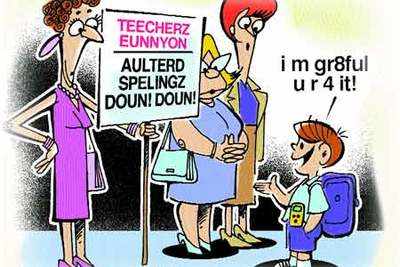Trending
This story is from August 27, 2014
Slangs changing the face of English language?
On English Language Day today — which is also William Shakespeare’s birth anniversary — TOI takes a look at the changing face of the language

On English Language Day today — which is also William Shakespeare’s birth anniversary — TOI takes a look at the changing face of the language
Author Mark Twain once famously said, “The difference between the almost right word and the right word is really a large matter — it’s the difference between the lightning bug and the lightning.” But are the author’s thoughts now outdated? Earlier this year, a Colombia University professor suggested that the comma be abolished, as he felt that the absence of the punctuation mark from modern text will not affect the clarity of what is written.The inclusion of SMS lingo in the Oxford dictionary only seems to justify this trend, with the addition of words like ‘defriend’, ‘selfie’, ‘bestie’ and ‘wackadoodle’.
Author Anita Nair feels that it is in the nature of a language to evolve and change with the times, and sees nothing wrong with the ongoing metamorphosis of the English language. “It’s perfectly fine for new words to be incorporated as that’s how a language grows. If this were not the case, we would be speaking a very antiquated language. The development of a language is a continued process — it makes sense for a language to grow and evolve as it absorbs whatever is happening around us. New words have always been incorporated into the dictionary. English has words from various languages like Portuguese, French and Spanish, and we don’t even think twice about this.”
But Anita feels that a line must be drawn somewhere and one can’t do away with necessities. “I don’t believe that abolishing something like the comma is necessary, as it is integral to phrasing. Punctuation is a fine art and must be handled with care to get the maximum effect,” she adds.
Sheryl Puthur, English teacher at Mount Carmel College, is worried about this trend. “I am very particular that my students not use SMS language. In fact, I do not even approve of them using apostrophe words in formal writing, such as ‘couldn’t’ and ‘shouldn’t’. I prefer they use ‘could not’ and ‘should not’ instead. It might seem a little fastidious, but there are students who write ‘btw’ (by the way) and ‘yr’ (your), and frankly, it’s irritating,” she says.
But unlike the popular notion that SMS lingo is the preferred method of communication of youngsters, there is a growing number who are becoming conscious of their grammar. Ipshita Magh, a medical student, for instance, says that she prefers to be grammatically correct, even while sending SMSes. “I keep the T9 (dictionary) feature on my phone on so that I don’t use short forms even while messaging. I don’t use SMS lingo in my college texts either, as I find it really troublesome to read.” Deena Dixon, an English major student, echoes this sentiment and adds that even though she tends to use a lot of short forms while messaging, she is careful not to do so during exams. “However, there are two words that I tend to misspell due to my texting habit. I unintentionally write ‘but’ and ‘between'’ as ‘bt’ and ‘b/w’,” she says.
(With inputs from Mira Nair)
Author Mark Twain once famously said, “The difference between the almost right word and the right word is really a large matter — it’s the difference between the lightning bug and the lightning.” But are the author’s thoughts now outdated? Earlier this year, a Colombia University professor suggested that the comma be abolished, as he felt that the absence of the punctuation mark from modern text will not affect the clarity of what is written.The inclusion of SMS lingo in the Oxford dictionary only seems to justify this trend, with the addition of words like ‘defriend’, ‘selfie’, ‘bestie’ and ‘wackadoodle’.
Author Anita Nair feels that it is in the nature of a language to evolve and change with the times, and sees nothing wrong with the ongoing metamorphosis of the English language. “It’s perfectly fine for new words to be incorporated as that’s how a language grows. If this were not the case, we would be speaking a very antiquated language. The development of a language is a continued process — it makes sense for a language to grow and evolve as it absorbs whatever is happening around us. New words have always been incorporated into the dictionary. English has words from various languages like Portuguese, French and Spanish, and we don’t even think twice about this.”
But Anita feels that a line must be drawn somewhere and one can’t do away with necessities. “I don’t believe that abolishing something like the comma is necessary, as it is integral to phrasing. Punctuation is a fine art and must be handled with care to get the maximum effect,” she adds.
With increased influence of technology and the rapid speed of instant messaging, abbreviated words and slang are not only making their way into the virtual world, but into academics as well.
Sheryl Puthur, English teacher at Mount Carmel College, is worried about this trend. “I am very particular that my students not use SMS language. In fact, I do not even approve of them using apostrophe words in formal writing, such as ‘couldn’t’ and ‘shouldn’t’. I prefer they use ‘could not’ and ‘should not’ instead. It might seem a little fastidious, but there are students who write ‘btw’ (by the way) and ‘yr’ (your), and frankly, it’s irritating,” she says.
But unlike the popular notion that SMS lingo is the preferred method of communication of youngsters, there is a growing number who are becoming conscious of their grammar. Ipshita Magh, a medical student, for instance, says that she prefers to be grammatically correct, even while sending SMSes. “I keep the T9 (dictionary) feature on my phone on so that I don’t use short forms even while messaging. I don’t use SMS lingo in my college texts either, as I find it really troublesome to read.” Deena Dixon, an English major student, echoes this sentiment and adds that even though she tends to use a lot of short forms while messaging, she is careful not to do so during exams. “However, there are two words that I tend to misspell due to my texting habit. I unintentionally write ‘but’ and ‘between'’ as ‘bt’ and ‘b/w’,” she says.
(With inputs from Mira Nair)
End of Article
FOLLOW US ON SOCIAL MEDIA









